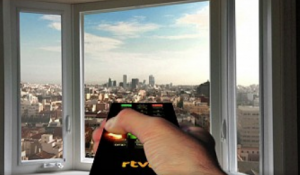
After more than 40 years of operation, DTVE is closing its doors and our website will no longer be updated daily. Thank you for all of your support.
Broadcasters get together
 Spain’s leading terrestrial broadcasters teamed up this week to develop an OTT TV platform that could compete with other streaming video providers in the increasingly crowded Spanish market.
Spain’s leading terrestrial broadcasters teamed up this week to develop an OTT TV platform that could compete with other streaming video providers in the increasingly crowded Spanish market.
The move by public broadcaster RTVE and commercial players Atresmedia and Mediaset España, which will initially see them launch an interactive TV platform, based on the HbbTV standard, to be followed by a full-fledged OTT service in the near future, follows moves by other European broadcasters and media groups to develop a bigger online presence.
Collaboration is the watchword here. Broadcasters know they lack the scale to compete with the likes of Netflix globally, but they believe that a collaborative effort can help them find their own place in the emerging OTT landscape.
For Europe’s public broadcasters, witnessing the slow advance of streaming services and aware of the likelihood of diminishing public support for the licence fee model in the long-term, the need to establish a solid footing in the new world is pressing. But the path is not always smooth. Also this week, France Télévisions put its plans for an SVOD service temporarily on hold while it engages with potential partners TF1, M6 and Orange to launch something commonly referred to as a ‘French version of Hulu’.
The move follows criticism – including from former France Télévisions programming chief Xavier Couture – that taking on Netflix and Amazon was something of a fool’s errand. A better model, it is suggested, would be a partnership with other broadcasters to create a free online platform, possibly with premium options.
Also calling for collaboration recently was the UK’s media regulator-in-chief Sharon White. The Ofcom CEO called on British public service broadcasters to collaborate, not only with each other, but also “the likes of Facebook, YouTube, Netflix, Amazon and Apple” to expand their global reach.
Broadcasters may be somewhat nervous about putting their heads into the lion’s mouth. The big tech giants can outspend them on content and enjoy the benefits of instant global reach, without having to submit to any of the burdensome regulations and commitments to local production placed on already underfunded national players. BBC deputy director-general Anne Bulford, speaking at the same conference as White, warned that UK content production will increasingly come under threat as the budgets available to local broadcasters are whittled down over time.
Broadcasters could ultimately face a perfect storm of developments that already look threatening enough: the growing power of tech giants and global video services; diminishing willingness of younger viewers to support a licence fee model in the case of public broadcasters; declining TV advertising revenues in the case of commercial players, and the long-term threat that spectrum currently reserved for terrestrial broadcasting will be re-allocated, leaving the broadcasters to compete solely in the online world dominated by the global giants.
Little wonder then that broadcasters are scrambling to develop their own streaming services. Unfortunately, the path to collaboration is strewn with boulders to trip up the unwary traveller, however. The fate of Vivendi’s plan for a ‘European Netflix’ in partnership with Mediaset are testament to that.
This doesn’t mean that broadcasters shouldn’t persist. There remains a strong well of demand for the kind of content – whether drama, news or light entertainment – that global players are unlikely to interested in supplying. If broadcasters can find a way to collaborate to develop relevant digital platforms as vehicles for distribution, they could at least have something to build on the secure their long-term future.
The current real-life drama building around the use and misuse of data should serve as a warning about the danger of leaving the entire future of video distribution – along with advertising, e-commerce, publishing and just about everything else – to a few giant global corporations.


